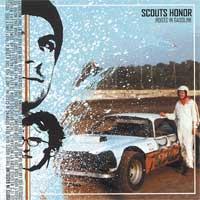Roots In Gasoline is a cross-country road trip making half its stops in roadside dives full of mechanical bulls and cowboy hats, and the other half in decrepit basements with bad ventilation and a mass of sweaty, screaming kids. It is a blue-collar declaration carved into the bar at some box-sized watering hole that stands across the street from bright and gaudy marquees promoting the next big thing. It is a two-man protest rooted in frustration and stated with conviction. But more than anything else, Roots In Gasoline is a batch of honest rock songs.
Scouts Honor is Jared Grabb on guitar and vocals and Tom "Atomic" Satterfield on drums and backing vocals. Throughout Roots In Gasoline the two cling to bits of Americana and back porch aesthetics while touching on everything from acoustic blues numbers ("Roots In Gasoline," "Devil Between"), to Against Me!-styled punk ("Cost Of Living," "Lovable Mama"), and straight-up hard rock ("Other Side Of Town," "Better Life"). While this may seem like the album would come off disjointed, it doesn't. Scouts Honor have the ability to tie together a host of musical variables with strong vocals, and a keen storytelling ability in order to make them their own.
Jared Grabb's gruff voice can shift from hushed reflections to defiant screams with no problem as he channels both Ian MacKaye and Tom Gabel. Instead of hiding behind production, he lets it all come out. His melodies might not be "stuck in your head" caliber, but you will never doubt Grabb's sincerity.
Lyrically, Scouts Honor focus on political issues, but by connecting social themes to personal narratives the words never come off preachy or heavy-handed. A range of topics are covered over the course of the album including workers' rights, the values of a small town, and using a system of oppressive laws to keep capitalism alive and well.
While Roots In Gasoline is passionate, diverse, and interesting, it still has its problems. Some of the songs seem to go on for a bit too long as added parts just clutter the structure. Also, "Call And Response," the album's all-a cappella closing track, seems out of place after ten rock-based songs, thanks to its gospel-styled singing. Finally, there is Grabb's simplistic diction. At times it is endearing and appropriate because of its everyman quality, but at other points it just leads to repetition and predictable lines.
